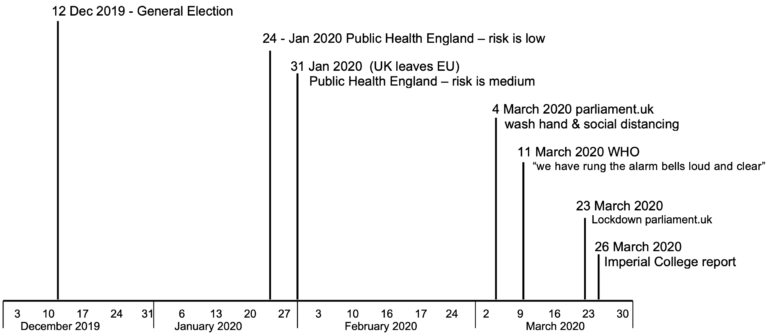“Our policy is driven by science”
 Figure 11.1. Timeline to the UK Lockdown
Figure 11.1. Timeline to the UK Lockdown
Politicians have the problem that, even if they believe in evidence-based policy, the evidence they receive from scientists can be inconsistent or downright contradictory. For example, Jasmina Panovska-Griffiths [1] writes:
The Imperial model suggests that the virus is still in the initial, fast-growing part of the epidemic curve. More recently, another model, developed by the research group of Sunetra Gupta at Oxford University, suggested that “ongoing epidemics in the UK … started at least a month before the first reported death” and that the virus has already spread widely across the UK population.
In the past two weeks, the number of cases of COVID-19 outside China has increased 13-fold, and the number of affected countries has tripled.
There are now more than 118,000 cases in 114 countries, and 4,291 people have lost their lives. Thousands more are fighting for their lives in hospitals. In the days and weeks ahead, we expect to see the number of cases, the number of deaths, and the number of affected countries climb even higher. WHO has been assessing this outbreak around the clock and we are deeply concerned both by the alarming levels of spread and severity, and by the alarming levels of inaction.
We have therefore made the assessment that COVID-19 can be characterized as a pandemic.
Pandemic is not a word to use lightly or carelessly. It is a word that, if misused, can cause unreasonable fear, or unjustified acceptance that the fight is over, leading to unnecessary suffering and death. This is the first pandemic caused by a coronavirus and we have never before seen a pandemic that can be controlled … we have called every day for countries to take urgent and aggressive action.
We have rung the alarm bell loud and clear. [2]
Based on the available evidence, the current risk to the UK is considered low with proportionate and precautionary measures being taken for flights arriving from China. [4]
Yesterday the World Health Organization declared this as a global health emergency and in response, the four UK Chief Medical Officers raised the risk to the public from low to moderate. We can also confirm this morning that two patients in England, who are members of the same family, have tested positive for coronavirus and they are receiving specialist NHS care. [5]
Role SAGE is responsible for ensuring that timely and coordinated scientific advice is made available to decision makers to support UK cross-government decisions in the Cabinet Office Briefing Room (COBR). The advice provided by SAGE does not represent official government policy.
The membership of SAGE … typically includes leading experts from within government and leading specialists from the fields of academia and industry. [5]
Within a few weeks of the perceived low level risk scientists, many of them members of SAGE, had conducted extensive modelling and this had a decisive impact on the policies and policy changes adopted. And, as we have seen, the Imperial College Report contributed to the lockdown policy of 23rd March.
A problem for any government is that they want their policy to be based on the best possible forecasts but, perplexingly for them and the public, different scientists use different models that may give different forecasts. This is also the case for members of SAGE.
Most governments claim “our actions have at all times been driven by the science”. However this gives a misleading view of science. Science progresses by disagreement. Challenging and pressure-testing each other’s arguments, models and results is the norm. It is common for different scientists to give different opinions on what might happen. Even the Governments advisors on SAGE do not speak with one voice and many contrary scientific opinions have been given in the media.
Given the range of views from the scientific community, alongside many other considerations, governments have to make judgement calls on what is best to do – and take responsibility for it.
At best science and modelling can provide a signpost for a policy road that may take many twists and turns.
What do you think
Do you accept that some things are unpredictable but can usefully be forecast? Do you think the WHO called Covid-19 a pandemic at the right time? Are the scientists in your country speaking with one voice? Do you know anything about the models being used in your country?
References
[1] Jasmina Panovska-Griffiths, ‘Coronavirus: we’ve had ‘Imperial’, ‘Oxford’ and many more models – but none can have all the answers’, The Conversation, April 3, 2020 3.37pm BST. https://theconversation.com/coronavirus-weve-had-imperial-oxford-and-many-more-models-but-none-can-have-all-the-answers-135137
[2] WHO Director-General’s opening remarks at the media briefing on COVID-19 – 11 March 2020, https://www.who.int/dg/speeches/detail/who-director-general-s-opening-remarks-at-the-media-briefing-on-covid-19—11-march-2020
[3] Joe Owen, Maddy Thimont Jack, Georgina Wright, Jess Sargeant, Alex Stojanovic and Haydon Etherington Getting Brexit done: what happens now?, Institute For Government, January 2020. https://www.instituteforgovernment.org.uk/sites/default/files/publications/getting-brexit-done.pdf
[4] D. Selbie, ‘Duncan Selbie’s Friday Message – 24 January 2020’, Public Health England. https://publichealthmatters.blog.gov.uk/2020/01/24/duncan-selbies-friday-message-24-january-2020/
[5] D. Selbie, ‘Duncan Selbie’s Friday Message – 31 January 2020’, Public Health England. https://publichealthmatters.blog.gov.uk/2020/01/31/duncan-selbies-friday-message-31-january-2020/
[6] Gov.uk, Scientific Advisory Group for Emergencies (SAGE), https://www.gov.uk/government/groups/scientific-advisory-group-for-emergencies-sage
Share this
COVID-19: Pandemics, Modelling, and Policy


Reach your personal and professional goals
Unlock access to hundreds of expert online courses and degrees from top universities and educators to gain accredited qualifications and professional CV-building certificates.
Join over 18 million learners to launch, switch or build upon your career, all at your own pace, across a wide range of topic areas.
Register to receive updates
-
Create an account to receive our newsletter, course recommendations and promotions.
Register for free







